Portugal’s Algarve…it brings to mind glittering, golden-sand beaches, hidden coves surrounding by towering limestone cliffs, 300 days of sunshine a year, and cocktails by the pool. This southern region has long been a popular vacation spot for Europeans for decades, the British and Germans in particular.
But there is another side to the Algarve that offers a quieter, calmer, and more laidback vibe. Where thousands of years of history are on display…and you actually forget that you’re in Portugal.
The Phoenicians, the Romans, and the Visgoths all ruled this area. Then in the 8th century, it came under Muslim rule and stayed that way for five centuries. Get away from the coast and up into the hills and you’ll still see signs of that Moorish influence.
Are you interested in retiring abroad? Yes | Not Sure Yet
Last week, I spent four days (and 240 miles in my hire car) exploring this “other” Algarve. I got away from the beaches and tourists…and explored the white-washed towns and villages that sit quietly among the rolling green hills. But here’s the thing, even though it feels like a world away from the party, fun times atmosphere of the coast, the farthest away I got from the coast, was a 40-minute drive.
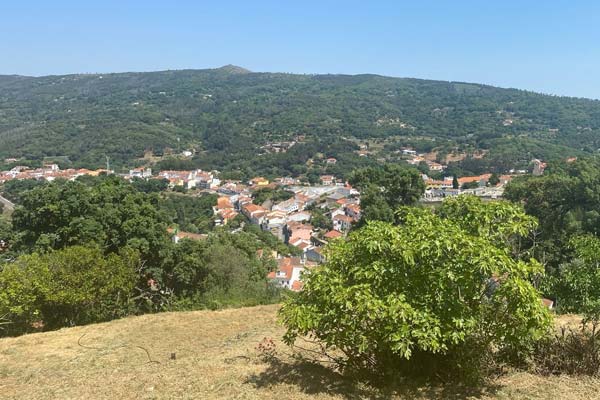
If you like the idea of living in a peaceful, little town, but still want to be close to an international airport, big-box stores, and the lively beach towns with their restaurants, bars, and entertainment, then you might consider this part of Portugal.
Though the towns of the Algarve’s interior I checked out all have pretty cobblestone streets, bright-white homes painted with accents of sunshine yellow and cornflower blue, and a laidback atmosphere, they all offer something different.
Sao Bras de Alportel
Take Sao Bras de Alportel…a 25-minute drive from Faro’s international airport. A town of about 11,000 people, that was once the center of cork production in all of Portugal. It has a large main square which is home to cafes and restaurants where the locals and tourists come for their mid-morning coffee.
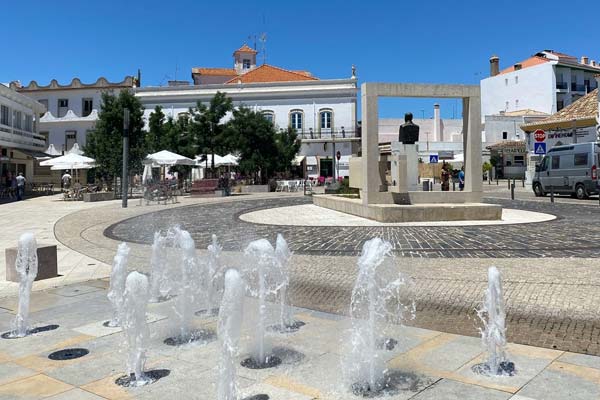
From here, I wandered around the narrow cobblestone streets of the old town, a mix of homes, small restaurants, cafes, and little shops stocking local produce (like honey) and handmade jewelry and crafts. At the edge of the old town, I found the municipal pool…an impressive and modern complex with a large pool, what looked like a smaller kids pool, a playground and a café.
Walking away from the charm of the old town, things start to get a bit more modern. A long wide avenue lined with clothing stores, coffee shops, lawyers offices, real estate agents, apartment buildings—everything you’ll need for day-to-day living—is the major artery from the main square to the outskirts of town. There are also two large supermarkets at the edge of town for all your essentials. If you want to live in town, I found a traditional home that has been fully renovated with two bedrooms, two bathrooms, a fully fitted kitchen, a living room with a mezzanine level. The asking price is €209,000 ($217,920).
Alte
If you’re looking for something a bit quieter, farther west (and about a half hour drive north of Vilamoura on the coast) is the small village of Alte. Charming, arty, and full of character, there’s only about 2,000 people in the town itself. It is a warren of cobblestone streets and white-washed homes with pops of color that give the place a cheery feel. Keep an eye out for the murals on the walls around town, I came across a few of them as I strolled in the morning sun.
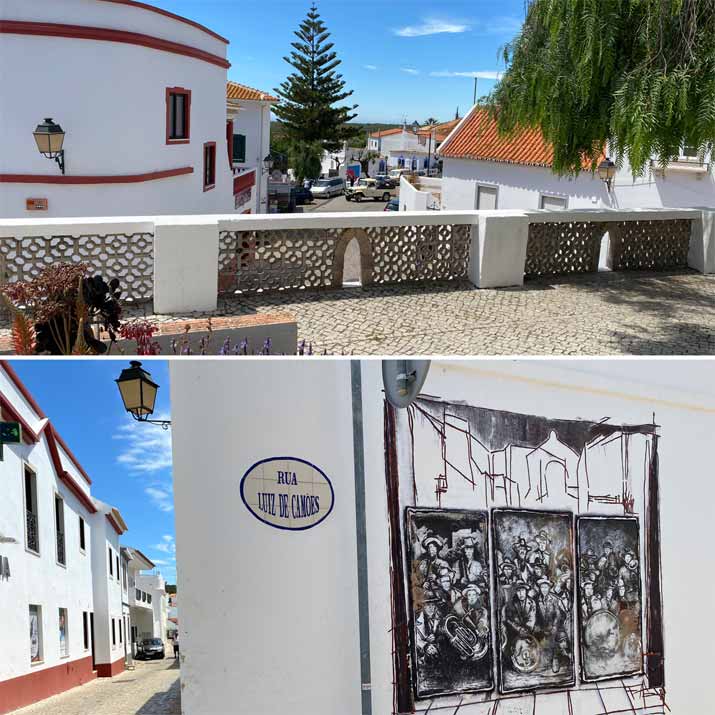
Alte is a popular day trip for vacationers from the coast, but I didn’t see any big tour buses. It was smaller groups of six or 10 people traveling in Jeeps. I stopped for lunch at Restauranta Folclore, a short walk from the small church in the middle of town. The diners appeared to be made up of equal parts locals and visitors, so I took that as a good sign. I ordered a hearty lunch of barbeque chicken that came with fries and a salad, a Sprite, water, and a coffee. The cost? Just €12.20 ($13). Make sure to get a table on the terrace, it offers spectacular views of the surrounding hills.
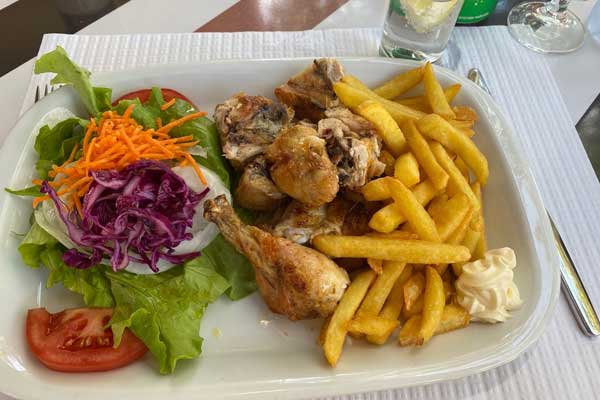
A lot of the homes currently for sale in Alte right now need renovation work. I came across a house right by the church, with eight rooms and two small patio areas that needs complete refurbishment for €95,000 ($99,030). For something more livable, I found a beautiful two-bedroom, two-bathroom home that has been completely renovated and modernized. It has a patio area and a roof terrace. This one is selling for €295,000 ($307,515).
Get Your Free Real Estate Report Now
Sign up for our free daily Postcard e-letter and get a valuable free report on the The 5 Best Places to Buy Real Estate In 2023.
Silves
The town that charmed me the most on this trip was Silves. Steeped in Moorish history, and famous for its castle, proudly standing guard over the town, there were times when I felt like I was Spain’s Andalucia region. It’s located about a 35-minute drive (on mostly highway) northeast of Lagos.
A walk along the castle walls (entry to the castle is just $2.90) for a birds eye view of the town. Below, the old and the new seamlessly combine. The red-tiled roofs of the old town stand beside modern apartment buildings but the contrast is not immediately evident. Newer buildings are also white and low-rise, so your eye isn’t instantly drawn to them.
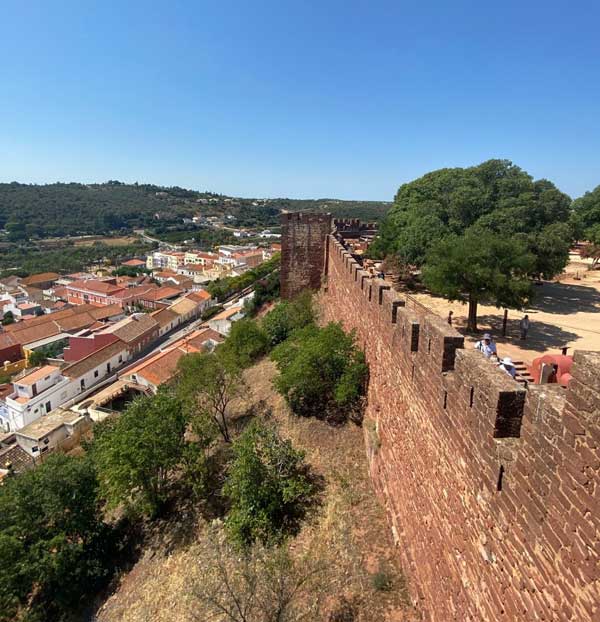
Originally the ancient capital of the Algarve, Silves was a major stronghold and trading center during Moorish rule. Besides the castle, history is everywhere—the city’s original gateway, the Portas de Cidade, still stands and there’s a portion of a 14th century pavement under it. It overlooks the pretty Largo de Municipo, a small square that’s home to the town hall.
The narrow streets of the old town (the narrowest I came across in all the towns I visited) are home to colorful tapas bars, restaurants, and little cafes where you can pick up a coffee and a pastel de nata (custard tart) for just €1.50, sit outside and people watch. A word of warning though, Silves is built on a hill, so everything goes up…on cobblestone streets. Bring sensible shoes!
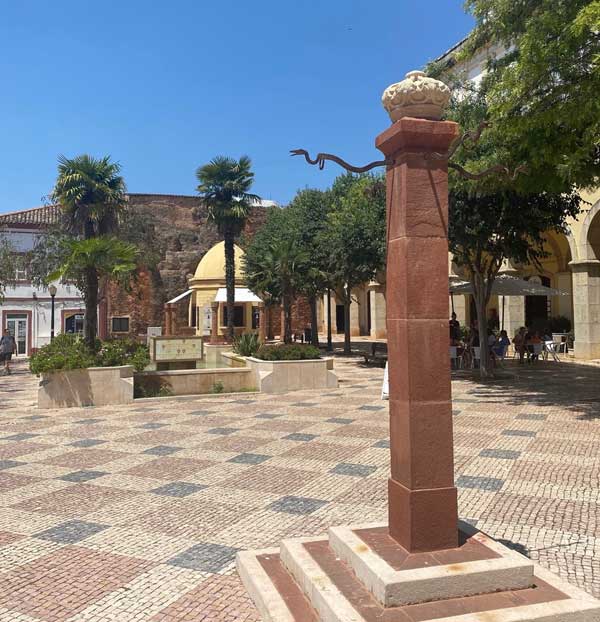
Right in the heart of the historic center, I found a two-bedroom, two-bathroom terraced house for sale. The interior is new and it has an open-plan kitchen/living area, a mezzanine level with another smaller living room, and is being sold fully furnished. Asking price is €199,000 ($207,445).
Watch a video of tour of Silves below:
Get Your Free Real Estate Report Now
Sign up for our free daily Postcard e-letter and get a valuable free report on the The 5 Best Places to Buy Real Estate In 2023.
Related Articles
Everything You Need to Know about The Algarve, Portugal
Real Estate & Property in Portugal
An Overview of Traditions and Culture in Portugal
Upcoming Conferences
The Only 2024 Fast Track Panama Conference
If your dream retirement involves stunning beaches… lush green mountains… a warm climate with no hurricanes… first-rate healthcare… incredible value for money (a couple can live well on $2,200 a month)… and the World’s #1 Retiree Discount Program…
Join our Panama experts and expats in February and discover why Panama could be your perfect paradise.
REGISTER NOW, SEATS LIMITED: EARLY BIRD DISCOUNT HERE

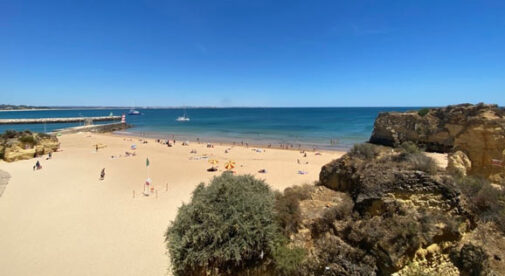
.png)